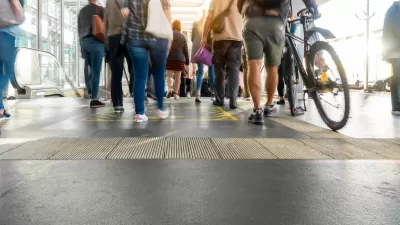The state’s Greenhouse Gas Planning Standard uses tangible financial penalties to prioritize transportation projects that reduce emissions.

In a guest post on TransitCenter, Planetizen’s own James Brasuell outlines a new Colorado rule that “rearranges regional capital investment plans to prioritize the transportation modes that most effectively reduce greenhouse gas (GHG) emissions: public transit, walking, and biking.”
The state adopted its GHG Transportation Planning Standard in December 2021, requiring its five metropolitan planning organizations (MPOs) to set clear emissions reduction goals. “Under the GHG Transportation Planning Standard, MPOs failing to meet greenhouse gas targets (GHG) targets are required to develop mitigation action plans” that contribute to “good projects,” i.e. those that help reduce vehicle miles driven and promote alternate modes of transportation.
Brasuell describes the broad-based coalition that grew around the effort to develop the Planning Standard, which encompassed various levels of government and nongovernmental advocates. Already, the Denver Regional Council of Governments (DRCOG) scrapped a freeway expansion plan due to the Planning Standard.
Colorado’s plan could well serve as a model for other states. “While many states’ climate plans are completely separate from their actual expenditure plans, the mode shift required by Colorado’s GHG Transportation Planning Standard will be enforced with tangible fiscal penalties–a degree of financial consequences not achieved by other laws around the country, such as California’s SB 375.”
FULL STORY: Colorado’s ‘Greenhouse Gas Planning Standard’ Changes the Transportation Equation

Planetizen Federal Action Tracker
A weekly monitor of how Trump’s orders and actions are impacting planners and planning in America.

Maui's Vacation Rental Debate Turns Ugly
Verbal attacks, misinformation campaigns and fistfights plague a high-stakes debate to convert thousands of vacation rentals into long-term housing.

San Francisco Suspends Traffic Calming Amidst Record Deaths
Citing “a challenging fiscal landscape,” the city will cease the program on the heels of 42 traffic deaths, including 24 pedestrians.

Amtrak Rolls Out New Orleans to Alabama “Mardi Gras” Train
The new service will operate morning and evening departures between Mobile and New Orleans.

The Subversive Car-Free Guide to Trump's Great American Road Trip
Car-free ways to access Chicagoland’s best tourist attractions.

San Antonio and Austin are Fusing Into one Massive Megaregion
The region spanning the two central Texas cities is growing fast, posing challenges for local infrastructure and water supplies.
Urban Design for Planners 1: Software Tools
This six-course series explores essential urban design concepts using open source software and equips planners with the tools they need to participate fully in the urban design process.
Planning for Universal Design
Learn the tools for implementing Universal Design in planning regulations.
Heyer Gruel & Associates PA
JM Goldson LLC
Custer County Colorado
City of Camden Redevelopment Agency
City of Astoria
Transportation Research & Education Center (TREC) at Portland State University
Jefferson Parish Government
Camden Redevelopment Agency
City of Claremont





























